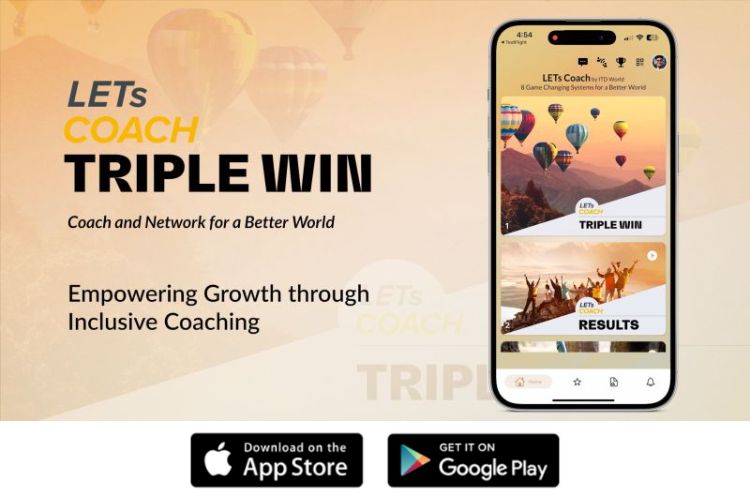Executive coaching has the potential to transform one’s leadership style and drive exceptional results. Learn proven strategies to enhance self-awareness, strategic thinking, and communication skills, leading to high-performing teams and organizational success!
In today’s rapidly evolving business landscape, organizations are increasingly recognizing the pivotal role of leadership in attaining sustained success. High-performing leaders are the catalysts for innovation, growth, and employee engagement. Executive coaching emerges as a powerful tool for developing these exceptional individuals.
|
Author: Aaron Ngui |
Highlights
- Executive coaching is a professional development process that enables leaders to achieve specific organizational goals by enhancing their self-awareness, emotional intelligence, and performance. It is a high-return investment that contributes to transforming leaders, boosting organizational performance, and creating a ripple effect of positive impact.
- Unlike teaching, consulting, therapy, and mentoring, coaching is about self-discovery and goal achievement on one’s own – not about handing out advice or guidance.
- Executive coaching is suitable for individuals at any career stage seeking to enhance leadership abilities, transform behaviors, and achieve their full potential.
- The process involves gathering feedback, setting specific goals, providing guidance and support, and monitoring progress to achieve desired outcomes.
- Common challenges to executive coaching include resistance to change, work-life balance, time constraints, and lack of self-awareness.
- To identify the best executive coach, consider their industry expertise, certifications, client testimonials, coaching style, and alignment with your goals. Before engaging in a session, make sure to define clear objectives, be open-minded to feedback, allocate sufficient time, and build trust with the coach.
What is Executive Coaching?
Executive coaching is a professional development process that aims to help leaders and managers improve their performance in the workplace – by developing self-awareness and emotional intelligence. Unlike traditional coaching, which typically focuses on personal development, it is designed for coachees to achieve specific goals within an organization. As a result, it has become an increasingly popular tool for leaders who want to take their careers to the next level.
Executive coaches work with their clients to identify areas of improvement, set goals, and create action plans. They also provide guidance and support as their clients work to achieve their goals. In addition to improving workplace performance and job satisfaction, they also help to build better team dynamics and improve communication within the organization.
Why Do Executives Need Coaching?
Improvement is hard. If it were easy, we’d already be better.
Marshall Goldsmith – World #1 Coaching Guru, ITD World strategic partner
Executive coaching is a strategic investment that empowers leaders to achieve extraordinary results. By focusing on strengths, addressing performance gaps, and developing critical leadership competencies, executives can significantly enhance their effectiveness and drive organizational success. Not to mention, the process also transforms them into role models for others, resulting in an even bigger impact on the organization, stakeholders, family, friends, and the community.
Over the years, various research has proven the impact of coaching on increasing leadership confidence, improving decision-making, and fostering stronger relationships. These outcomes translate into tangible benefits such as better engagement, productivity, and bottom-line performance.
For example, one study found that coaching led to a 48% increase in organizational performance (including revenue, retention, and customers as advocates), while another one revealed a potential impact on reducing turnover and building high-performing teams. In a survey conducted by Manchester, Inc., the ROI of executive coaching may be as high as 6 times the initial investment – including tangible and intangible business results:
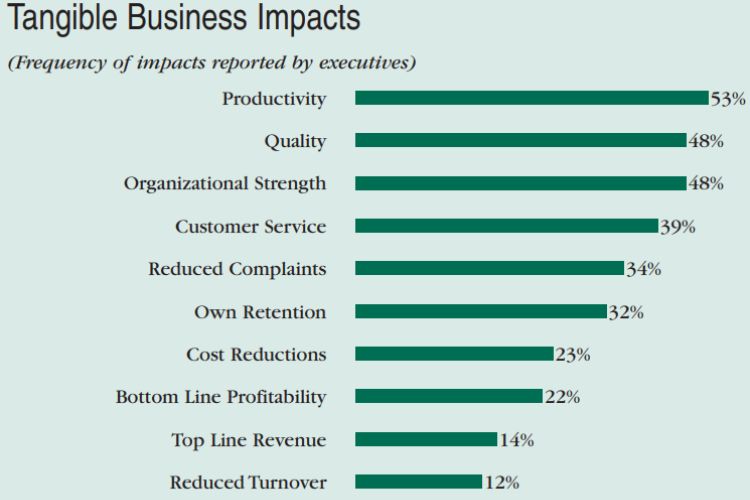
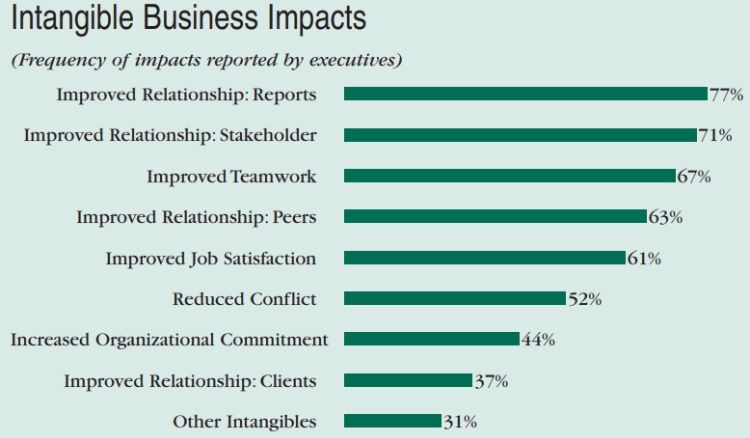
Various famous leaders have personally testified to the benefits of coaching. Satya Nadella’s transformation of Microsoft and Eric Schmidt’s leadership at Google exemplify this. Both CEOs credited executive coaching for fostering a growth mindset, building strong teams, and cultivating empathetic cultures. These leadership principles, often overlooked in fast-paced environments, were essential to their companies’ remarkable achievements.
Those who have undergone positive behavior and habit transformation multiply their value exponentially. They powerfully enable their teams to accomplish more to achieve big wins for sustainable success as their influence increases.
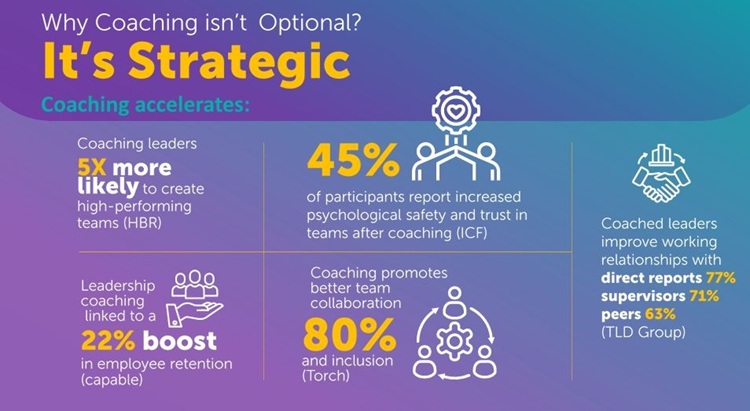
The ROI of coaching according to research from a top leader at PETRONAS – one of Asia’s most respected organizations in leadership excellence
5 Ways Executive Coaching Benefits Leaders
-
Empowerment
Coaching is effective because it is personal, behavior-oriented and targeted to the individual.
Rick Brandt
Through a combination of great questions, intuition, and influence, coaches empower individuals to delve deep into their strengths, weaknesses, and motivations. This heightened self-awareness is foundational to personal and professional growth. As leaders gain a clearer understanding of their values, aspirations, and leadership style, their confidence and sense of purpose will soar as a result.
Beyond self-reflection, the process is also instrumental in skill development. Specifically, coaches may aid in identifying areas where leaders can enhance their capabilities – whether it’s refining communication skills, sharpening decision-making abilities, or mastering problem-solving techniques. By addressing specific developmental needs, leaders become more effective in their roles and better equipped to navigate complex challenges.
Moreover, executive coaching creates a safe and confidential space for those involved to explore their limitations without fear of judgment. Through consistent support and accountability, leaders are empowered to realize their aspirations and achieve extraordinary results.
-
Alignment
Through a collaborative process, coaches assist leaders in acquiring a comprehensive understanding of the company’s strategic direction, vision, and goals. This strategic focus empowers the latter to make informed decisions and take actions that contribute directly to collective success – thereby enhancing their credibility at all levels.
With their perspective broadened, leaders become better equipped to assess the impact of their decisions on the entire team – which translates to more informed choices regarding resource allocation and prioritization. Coaches can aid them in analyzing their department’s or team’s contributions to the overall business strategy, ensuring that resources are deployed optimally to achieve key objectives.
Additionally, executive coaching facilitates the development of clear and measurable performance indicators (KPIs), which serve as benchmarks for tracking progress toward organizational goals. Coaches work with leaders to identify relevant metrics and establish systems for monitoring performance. This data-driven approach enables them to make adjustments as needed, so that the organization may stay on track along the way to its desired outcomes.
-
Clarity
Even the best-of-the-best CEOs have their blind spots and can dramatically improve their performance with an outside perspective weighing in.
Stephen Miles
Through proven frameworks and methodologies, leaders may break down intricate issues into manageable components, identify root causes, explore potential solutions, and assess the risks/ rewards associated with such different options. The result is improved clarity – as they become aware of the strategies, tactics, and actions required to overcome roadblocks and get the job done.
Enhanced clarity and confidence cultivated through executive coaching lead to a significant increase in decision-making speed. When leaders have a clear understanding of the situation, potential outcomes, and desired results, they can make decisions more swiftly and decisively. This agility is crucial in today’s fast-paced business environment, where timely actions can be the difference between success and failure.
Read more: Agility Coaching – Navigating Change & Fueling Business Success
-
Collaboration
No one wins alone – even an elite Olympic runner requires an entire team for support in winning the gold medal. Similarly, to guarantee long-term success, leaders need to tap into the strengths, talents, and passion of people around them for big wins.
Executive coaching is instrumental in cultivating a collaborative environment that fosters high-performing teams. By delving into team dynamics, coaches help leaders gain a deeper awareness of the complex interplay between team members – including individual strengths & weaknesses, communication styles, etc. Armed with such knowledge, leaders may create an environment where team members feel valued, supported, and empowered to contribute their unique perspectives.
-
Results
Goal setting is a cornerstone of effective coaching. With specific, actionable goals in mind, leaders become equipped with a clear roadmap for success and may focus their efforts accordingly.
To ensure that these objectives are met, coaches often play the role of an accountability partner. Regular check-ins, progress tracking, and continuous feedback are essential for one to stay focused and motivated. Scorecards and follow-up systems may also be established to further ensure sustainability.
A leader’s role is to maintain good relationships, enable performance, and grow their people. Coaching accomplishes all of that.
Peter Chee & Jack Canfield

Functions of an executive coach
Read more: Executive Leadership – A Guide to Developing Tomorrow’s Titans
How Does Executive Coaching Work? Key Steps in the Process
-
Soliciting feedback
Executive coaching usually begins by gathering feedback from one’s managers, direct reports, peers, stakeholders, and direct reports anonymously. Such information reveals the strengths they can leverage to transform – as well as any potential areas for improvement.
-
Conducting coaching sessions
Leaders are then coached to focus on the specific topics/ areas they want to transform – whether it is a personal development or business goal (as long as it is measurable, time-bound, and aligned with the organization’s core objectives). While the meeting frequency may vary based on the executive’s needs, a common approach is to start with weekly or bi-weekly sessions – before gradually decreasing it as the executive becomes more independent. In addition, depending on the goals’ complexity and the desired level of transformation, the whole journey may range from 3-12 months (or even longer).
During this process, powerful questions and motivational techniques are typically employed by the coach to help the leaders:
- Tap into their creativity and hidden potential
- Set breakthrough goals that bring out the best in themselves
- Identify potential roadblocks, and
- Formulate winning strategies for sustainable competitive advantage
Coaching question examples by topic:
- Self-reflection & awareness:
- “What are your biggest accomplishments, and what do you attribute your success to?”
- “In what areas do you feel you could improve as a leader?”
- “What are your core values, and how do they align with your current role?”
- Goal setting & action planning:
- “What specific steps can you take to overcome the challenges you’ve identified?”
- “How will you measure your progress toward your goals?”
- “What support do you need to achieve your desired outcomes?”
- Performance & development:
- “What feedback have you received from your team members, and how are you responding to it?”
- “How do you balance your professional and personal life?”
- “What are your long-term career aspirations?”
Motivational techniques:
- Appreciation & Recognition: Acknowledging the executive’s strengths and accomplishments.
- Visualization: Helping the executive create a clear vision of their desired future.
- Growth mindset: Encouraging a belief in continuous learning and development.
Assessments such as 360-degree feedback and personality tests (e.g. Myers-Briggs, DISC, etc.) may be utilized to foster self-awareness and development.
Read more: 12 Leadership Coaching Topics to Drive Lasting Transformation
-
Accountability & support
All ideas discussed in the sessions are generated by the leaders themselves; they are then translated into tactics and action steps captured in a coaching log. This log serves as a record and “success diary” throughout the entire journey.
The executive coach will also assist leaders in establishing a personal accountability system, strong support structures, and scorecards – so that they may stay the course to obtain the desired results. Whenever a milestone is achieved, positive reinforcement is necessary to maintain the momentum.
Read more: One-on-one Coaching – The Art of the Breakthrough
Executive Coaching: A Case Study of John
John was a sales engineer at a leading equipment supply company who had accumulated a number of customer complaints. In the following snapshot of the conversation, we can see how John benefited from being coached as he
- Became empowered to pursue his goals;
- Align his actions with business results;
- Obtained clarity on what needed to be done;
- Learned to collaborate with others.
John became highly motivated; he made changes and took action to produce results. This is an example of an effective coaching conversation – in which the coach leveraged the positive relational influence of asking questions, listening, and caring, rather than enforcing position.
*Extracted from Coaching for Breakthrough Success by Jack Canfield and Dr Peter Chee. To learn more about making impossible dreams possible, get your copy here.
Read more: 20 Best Coaching Books to Level Up Your Life
Challenges of Executive Coaching
- Resistance to change & personal development
Executives often rise to their positions due to a proven track record of success based on specific skills. This breeds a sense of confidence and expertise, which can inadvertently lead to behaviors such as being defensive about one’s ego, procrastinating, ignoring the need for change, or rationalizing reasons for their inertia. The fear of failure, loss of control, or uncertainty about the future often creates a significant barrier to personal development.
To effectively address such resistance, coaches must create a safe and supportive environment where executives feel comfortable exploring new possibilities. They need to establish a strong foundation of trust and rapport through active listening & empathy, frame change positively, encourage the clients to step outside their comfort zones, tailor their strategies, and prove ongoing support.
Example:
“I understand that you’ve achieved remarkable success in your role, and your leadership style has been instrumental to the company’s growth. However, I’ve noticed that you sometimes seem hesitant to explore new approaches. Can we talk about the challenges you’ve faced when considering change?”
Read more: Ego in the Workplace – The Hidden ‘Evil’ Behind Team Dysfunctions
- Balancing leadership & personal life demands
Executives typically find themselves caught in a relentless cycle of high-pressure demands. Constantly juggling between responsibilities is a major cause of burnout, decreased job performance, and strained relationships. As a coach, your job is to aid them in finding equilibrium between their work and personal lives – by equipping them with skills such as prioritization, time management, mindfulness, boundary setting, etc.
Example:
“I understand that you’re feeling overwhelmed by the demands of your role. It’s common for high-achieving executives to experience this level of pressure. Let’s talk about some strategies to help you regain control of your time and reduce stress.”
- Time constraints
Demanding schedules make it challenging for leaders to carve out dedicated time for coaching – which may not only reduce the process’ effectiveness but also result in shallow discussions and difficulty integrating insights. To maximize the impact of coaching within limited timeframes, coaches may consider offering a variety of scheduling options to accommodate busy clients, including early mornings, late evenings, and virtual sessions. On top of that, they should prepare thoroughly for each session in advance, and map out key takeaways/ clear action steps for executives to implement between sessions.
- Lack of self-awareness
While executives often possess a deep understanding of their industries and organizations, many of them struggle with self-awareness (i.e. understanding their strengths, weaknesses, values, and impact on others), which leads to a variety of interpersonal problems (e.g. impaired decision-making, strained relationships, inability to inspire others, inflated self-perception, difficulty receiving constructive criticisms, etc.). Through techniques such as selective questioning, behavioral analysis, or mindfulness exercises, coaches play a vital role in enabling leaders to gain a deeper understanding of themselves.
Example:
“I’ve noticed that you tend to interrupt others during meetings. How do you think this behavior impacts your relationships with colleagues?”
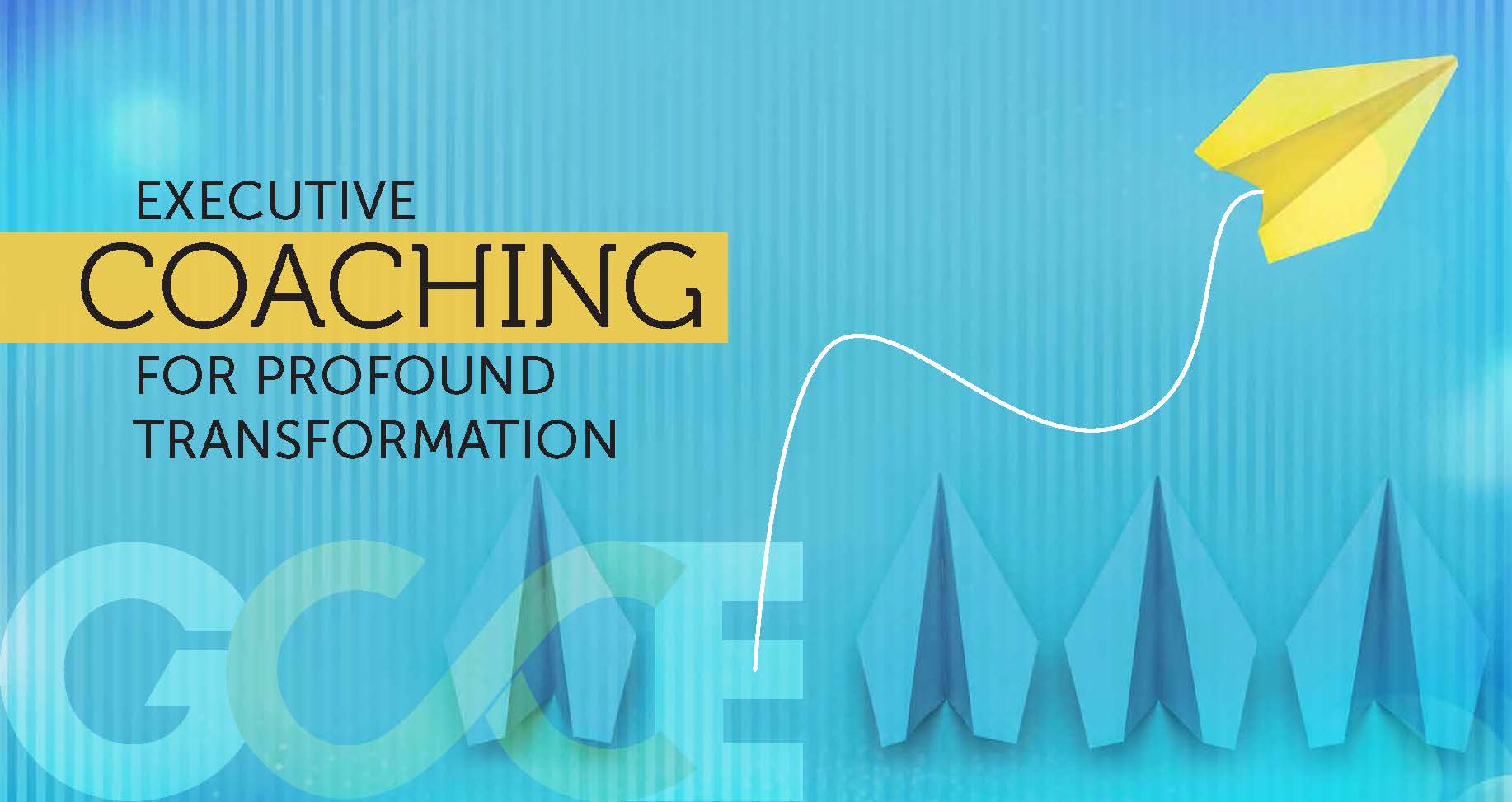
Read more: 10 Common Coaching Challenges – Navigating Difficult Scenarios
FAQs
What executive coaching is not
- Teaching nor training
Coaching is not about imparting knowledge or skills. Instead, the purpose is to help individuals make lasting changes in their lives that will lead to success – both within the personal and professional realms.
- Consulting
Unlike consulting, coaching is not focused on solving specific problems or providing expert advice. Instead, the coach works with the individual to identify areas of development and create a growth plan. They also offer support and accountability, so that the client may better stay on track and make progress toward their goals.
- Therapy
Coaching is not focused on resolving personal problems or providing emotional support. Instead, it is a goal-oriented process that enables one to identify their strengths and weaknesses and develop actionable improvement plans.
Mentoring involves a rather informal relationship between two people, in which the mentor provides advice and guidance to the mentee – and the latter looks up to the former as a role model. Communication is typically based on mutual respect and trust.
For coaching, however, the one in charge is the coachee. Instead of providing specific guidance, the coach’s job is to actively listen and ask meaningful questions capable of stimulating their client’s self-awareness.
Executive coaching motivates people to try something they’ve never done before. It’s a question-based approach.
Jeff Nally, SHRM-SCP
That being said, sometimes the executive may be looking for a subject matter expert and role model in a specific area the coach specializes in. If both sides agree, the latter could then play the role of a mentor to add value to the leader.
Read more: Coaching vs Mentoring – Define the Differences
Who is executive coaching for?
Executive coaching is a powerful tool for personal and professional growth accessible to individuals at every career stage. Contrary to the common perception that it’s reserved for senior leaders, coaching is actually a beneficial investment for anyone seeking to enhance their leadership abilities and reach their full potential.
Key objectives:
- Transforming behaviors and habits positively.
- Leveraging on strengths, talents, and passions to drive transformation.
- Discovering and tapping deeply into key motivators for attaining desired outcomes.
- Generating higher influence for a bigger impact on the organization and stakeholders.
- Creating a personalized action plan for massive execution.
Whether you are just starting in your career or already a seasoned executive, coaching is the key to honing your skills and taking your career to the next level. Early-career professionals may benefit from acquiring strong foundational leadership skills, while mid-level managers may expect to have their strategic thinking and decision-making capabilities enhanced.
How can you identify the best executive coach?
While industry experience is beneficial, it is recommended that you find a coach with a deep understanding of the specific challenges and opportunities within your niche – especially if you are dealing with complex industry-specific challenges. For instance, a general business coach might not be as effective for a C-suite executive navigating regulatory changes in the pharmaceutical industry as one with deep experience in healthcare and life sciences.
Next, look for those certified by a reputable organization such as the International Coach Federation (ICF). Certifications are proof that they have received proper training and adhere to professional standards. Additionally, it’s crucial to inquire about their success stories and client testimonials to gauge their effectiveness.
Finally, choose one who you feel comfortable talking to and believe that they are capable of helping achieve your goals. For this purpose, consider their coaching style and methodology (different individuals respond better to different approaches) – as well as their overall value proposition. For example, a results-oriented executive might prefer a direct, goal-focused coach, while a more introspective leader might benefit from a coach with a strengths-based, empathetic approach.
Read more: 10 Characteristics of a Good Coach
How to set goals for executive coaching
While results are undeniably important, they often represent only a fraction of the client’s true story. Effective executive coaching involves delving deeper to uncover underlying challenges and aspirations. To this end, setting goals that encompass both the desired outcomes and the steps to achieve them is essential.
For instance, instead of simply aiming for a “10% increase in sales,” a more comprehensive target might be to “collaborate with the sales team to identify and overcome key performance barriers, ultimately leading to a 10% sales increase.” This approach not only focuses on the desired result but also emphasizes the process of visualizing it. By shifting the focus from solely results to the entire journey, coaches empower clients to develop the skills and strategies necessary for sustainable success.
It’s crucial to remember, however, that crafting such holistic goals requires careful consideration. Balancing short-term and long-term objectives, ensuring client buy-in, and addressing potential challenges are vital components of the process.
Read more: 5 Executive Coaching Goals Leaders Need for Success
How to prepare for executive coaching
Before embarking on a leadership coaching journey, here are 4 tips for you to get the most out of it:
- Be specific about your final objectives. What areas of your business or life would you like to deal with? The clearer you are about what you would like to improve, the more likely you are going to get it in the end. Techniques such as SMART goal setting may come in handy for this task.
- Be open-minded to feedback. In order for coaching to truly work, you need to be ready for self-reflection, as well as be receptive to input from your coach.
- Make time for it. Executive coaching is not a quick fix; in some cases, it takes a long time (plus a great deal of commitment) for both sides to see tangible results. For this reason, make sure that you carve out enough time in your schedule to devote to the process.
- Trust is key. Remember that your coach is not there to judge you, but rather to help you grow and develop as a leader. As long as you have trust and maintain open communication, you should be able to see positive results from the experience.
Introduction to ITD World’s Executive Coaching Services
Team of experts
As a global leadership development expert, we at ITD World take pride in our team of internationally renowned executive coaches and mentors – who all come with a wealth of experience in helping leaders and executives reach higher levels of success. Among them are:
 |
|
 |
|
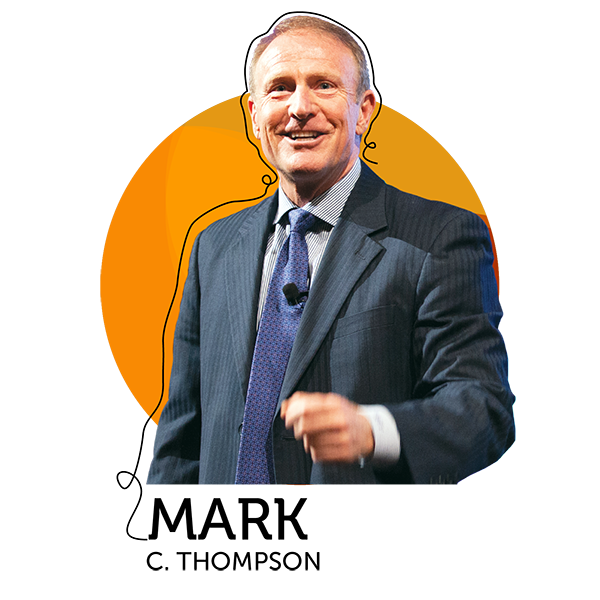 |
|
 |
|
 |
|
 |
|
 |
|
These are just a select few of ITD World’s highly qualified, knowledgeable, and experienced executive coaches and mentors who leaders in organizations can tap upon. View the full list here!
Content
Delivered by our top global master coach, ITD World’s development journey typically spans 12-18 months. Depending on the client’s needs and the matching of expertise, our experts may adopt the following approaches to add maximum value:
- Process Coaching – ICF approach: Pure Professional Coaching
- Content Coaching – Mentoring approach
- Sports Coaching – Hybrid approach that combines the 2 above-mentioned options with other forms of adding value

During the process, several methodologies are typically deployed – namely 360 assessment, modeling, discovery, derailer, scorecard, etc. – to maximize the return on investment. In terms of the specific content, we strive to cover the following 4 types/ domains of coaching mastery:
- Behavioral coaching: Focuses on transforming the executive through behavior and habit change to achieve their intended personal and organizational objectives.
- Life coaching: Revolves around the creation and enhancement of life purpose, vision, goals, strategies, action steps, plans, and execution for a holistic life.
- Strategic business coaching: Discusses organizational mission, vision, values, goals, strategies, tactics, and action plans to enable strong execution.
- Team coaching: Engages the team in discovery, planning, and achieving collective objectives – so as to build high-performance teams.
View the full brochure here.
*If you are interested, make sure to check out ITD World’s professional coaching roadmap – with certification programs designed to cater to the needs of both beginners and seasoned ones alike.
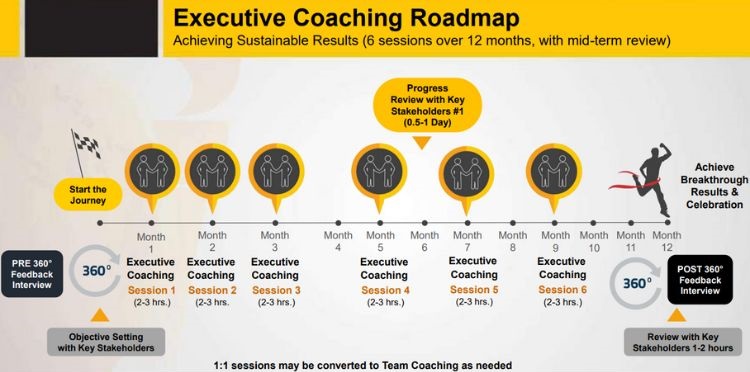
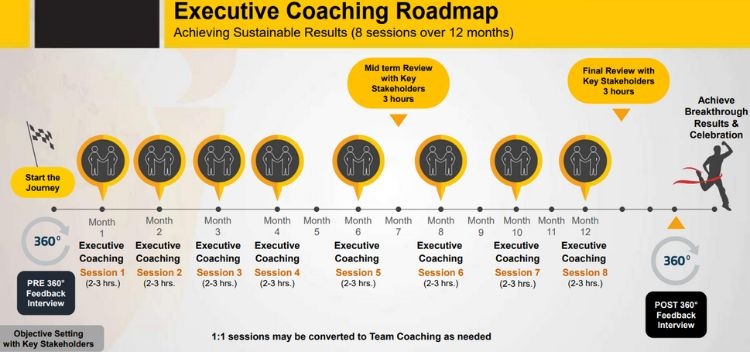
The 12 months executive coaching experience with ITD World has been absolutely outstanding. I along with my team have achieved a complete business turnaround, exceeding all key metrics. What is even more exciting is that the re-sults are holistic and sustainable. I am deeply grateful for such an amazing life changing journey.
Vishal Kaul, Senior Vice President, Pepsico
Jack Canfield and Dr. Peter Chee have crafted the standard for anyone wanting to be an effective coach. Anyone being coached should make sure that their coach knows and follows these standards.
Dave Ulrich, Professor, Ross School of Management, University of Michigan, Author of “Leadership Sustainability”
ITD World has been our coaching and leadership development partner for the past one year. Our talent and top leaders have shown significant improvement in the areas of strategy and goals align-ment, collaboration, passion and results-orientation. We have been able to overachieve on our bot-tom-line business breakthrough goal. ITD World truly at the fore-front of the global leadership transformation field. Thanks for the great support.
Lars-ake Norling, Chief Executive Officer, Dtac (Part Of Telenor Group, Norway)
Organizational case study: Aeon Vietnam’s success story
Final Thoughts
Executive coaching is an investment in leadership development that yields substantial returns. By fostering self-awareness, enhancing strategic thinking, and improving communication skills, it equips leaders with the tools to navigate complexities, inspire teams, and achieve extraordinary results. As organizations strive to build a competitive edge, investing in coaching becomes a strategic imperative for cultivating high-performing talents that can shape the future.
Take action to supercharge the accomplishments and growth for your organization, your team – and most importantly, yourself to gain greater love, happiness, and success in life! Contact ITD World today for a FREE consultation!
Other resources you might be interested in:
- 7 Types of Coaching in the Workplace: A Practical Guide
- 8 Effective Coaching Skills for Leaders & Managers
- Leadership Coaching Quotes to Empower Success
- Coaching Culture: Blueprint for Organizational Growth
- The Power of Introverted Leadership: Beyond the Stereotype


